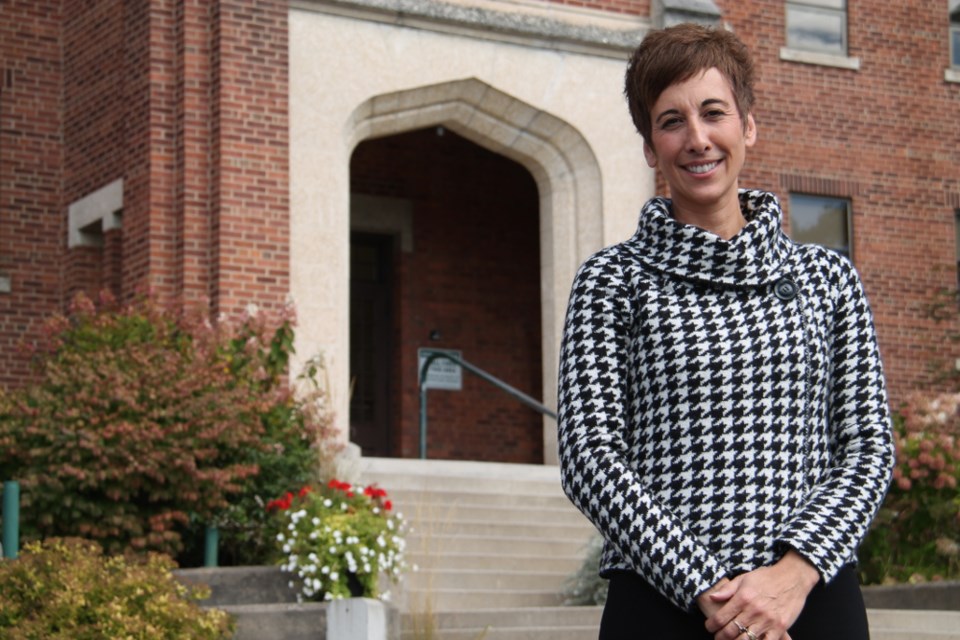Work is continuing on a feasibility study for a proposed mental health and addictions research and training institute for Northern Ontario and Algoma University’s president hopes the major stakeholders in the initiative will meet early in the new year to consider next steps.
If it moves forward, the university, Sault College, the Northern Ontario School of Medicine and Shingwauk Kinoomaage Gamig would partner and contribute programming in hopes of offering a local solution to the issues of mental health and addictions, said Algoma University president Asima Vezina.
“So you have quite a tremendous grouping of higher education institutes that really want to think about how they can contribute back to the research and training needs of Northern Ontario and Ontario as a whole and Canada — right from the front line workers to the professionals,” said Vezina.
The institute would also bring together local service providers like Sault Area Hospital, Canadian Mental Health Association and Algoma Child and Family Services.
A feasibility study is underway through a consulting firm which specializes in health care spaces. The results of that study will determine the next steps in bringing the proposal together.
“They are doing research across the country and around the world for us to look at partnership models that are working and are bringing some ideas back to us that we hope to be able to share with key stakeholders across the community,” said Vezina. “We are hoping by January we will be coming together to really consolidate what the partners have shared.”
Ross Romano, MPP for Sault Ste. Marie and Ontario’s minister of Government and Consumer Services, said his work on the file began early in his term when he led the Ministry of Colleges and Universities.
The original idea, said Romano, was to make Sault Area Hospital an academic teaching hospital specializing in mental health and addictions.
“I was trying to learn more and more about what kind of research institutions exist in the world around mental health and addictions and I was very surprised to see, other than a very focused research facility at the University of Western Ontario, there was no one exclusive institution that functioned as an academic teaching hospital that focused strictly on research and training on mental health and addictions,” he said.
“Given that I was the minister of colleges and universities I thought it would be great if we can find a way to bring in all of our educational institutions together,” said Romano.
Vezina said the plan for the institute would be for each of the schools associated with it to contribute programming.
Earlier this year, Algoma University began offering a new Minor program in Health, Wellness and Addictions. Vezina said that and other programs at the university could serve as the foundation of its contribution to the proposed institute.
“We will be delivering some very strong programming from micro-credentials to undergraduate degrees specializations and health sciences programming and masters programming in the psychology fields and other fields,” said Vezina. “We can also bring a lot of funding in through the research avenues as we become national leaders in that area over time.”
“As Sault College moves forward with the degree programming in nursing, having nurses that have that option to specialize in the field of mental health and addictions and being able to offer specialized training in that area makes a lot of sense,” she added.
Vezina said she is excited at the possibilities created from bringing together the Northern Ontario School of Medicine and Shingwauk Kinoomaage Gamig, to weave together the best of western science and medicine with Indigenous knowledge and practices.
“I think that brings a fairly unique contribution to the research field and training field,” she said.
Romano, who studied at Algoma University, said many of the mental health and addictions challenges faced by the community stem from the long-term effects of the former Shingwauk Indian Residential School.
“I walked the halls of Shingwauk Hall and there is something very special you feel when you are in that facility. When you are in that institution you can feel the history in that building and you can feel a lot of the pain and suffering in that building,” said Romano.
That’s why it was important to bring Algoma University and Shingwauk Kinoomaage Gamig into the plan, said Romano.
“The residential school period has led to so many of the problems we see in mental health and addictions, especially in Northern Ontario, so wouldn’t it be interesting and special and an advantage in a community like ours to be part of the solution to what is ultimately a national crisis?” Said Romano.
Vezina said the institute could bring a range of side benefits to the community if it is approved and built.
“When you build something like this you are bringing all kinds of professionals in at the PhD and masters levels, you will be hiring people so there will be a direct benefit to the community, but you are also sending a steady stream of talented graduates into the local workforce,” she said.
“Right now we are bringing a lot of external people in to service the community, we don’t have enough psychologists and psychiatrists, we are short in many areas of the specialized workforce that is required to work in this area. I think having an institute right here in our own community means that we will not have vacancies like we are seeing in the posted positions today.”
